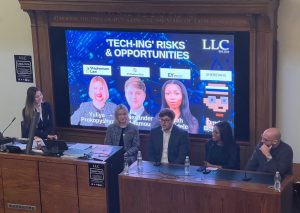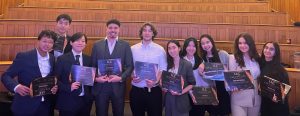Ee Vi Lim, penultimate year LLB student and Co-President for the London Law Conference 2022
It went back to 2018 when a non-law student in UCL, Sukhminder, decided to launch what has come to be known today as the London Law Conference (LLC) in the hopes of making the legal profession more accessible for students from various academic, economic, racial, and gender background.
As an international student who flew 10,500 km away from home to London and study law, the values and vision of the London Law Conference resonated well with me. As a delegate of the 2021 conference, I never would have thought that I will one-day become the Co-President alongside Jackie Warman for the 5th instalment of the London Law Conference on the 27th of November 2022; and yet, our predecessor, Ellen Ng, entrusted us with the responsibility to orchestrate the next London Law Conference.
Although these 4 months of preparation have not been short of challenges, we are grateful to be able to bring the conference in person back to UCL in collaboration with our co-host, the UCL Law for All Society which has been a consistent supporter of the LLC year after year. It is also very heart-warming to see the student community band together to make the London Law Conference possible with the contributions from UCL Guild and the University of Sussex Law Society, alongside campus ambassadors and committee members from various universities.
In light of the need to anchor the conference on an emerging trend and yet, stay true to our core of enhancing accessibility to law, it became clear to the committee and I that the topic of the day would be “Legal Tech: The Future & Beyond”.
As the legal industry becomes more efficient with the use of labour-saving technologies like contract automation, advanced documentation software, and AI analytics, we can see its potential of democratising justice. Simple legal advice which was once only available with the time and cost of engaging a lawyer can now be sourced online. However, the increasingly complex developments like smart contracts and blockchain technologies which necessitates regulatory reforms make us wonder if this is something that can be well understood by the masses, and who would be the ones who are left behind.
 Hence, we turned our particular attention on the impact of legal tech on the legal profession in the first panel on “Teching Risks and Opportunities” which speaks to the future of aspiring young lawyers like you and me. It wasn’t the easiest task to source speakers in the legal industry who are at the forefronts of new technological developments, but we were very fortunate to have Yuliya Prokopyshyn (blockchain solicitor from Stephenson Law), Alexander Adamou (barrister from 33 Bedford Row), Sarah Bamidele (regulatory technology contractor for EY), and Omri Bouton (IP lawyer from Sheridans) with us. Their discussion cuts to the core of the legal industry as a people profession and question the how the rise in technology have reshaped client management which prompts aspiring lawyers to think deep and hard about their “value-add” in this service chain.
Hence, we turned our particular attention on the impact of legal tech on the legal profession in the first panel on “Teching Risks and Opportunities” which speaks to the future of aspiring young lawyers like you and me. It wasn’t the easiest task to source speakers in the legal industry who are at the forefronts of new technological developments, but we were very fortunate to have Yuliya Prokopyshyn (blockchain solicitor from Stephenson Law), Alexander Adamou (barrister from 33 Bedford Row), Sarah Bamidele (regulatory technology contractor for EY), and Omri Bouton (IP lawyer from Sheridans) with us. Their discussion cuts to the core of the legal industry as a people profession and question the how the rise in technology have reshaped client management which prompts aspiring lawyers to think deep and hard about their “value-add” in this service chain.
The changes in the world will not wait for those who sit and stare in awe; the changes in the world can only be driven by those who are willing to get on the ground and give new things a try. This is precisely why we decided to integrate an interactive contract automation workshop in partnership with Avvoka, a member of A&O Fuse. Participants of the LLC therefore had the chance to receive step-by-step guidance in automating their very own employment contract and pick-up key concepts to set placeholders and conditions.
That said, legal tech will not only revolutionarise the day-to-day lives of individuals, but also affect social, environmental, and other contemporary developments in the world. The discussions between Dan Hyde (partner at Harrison Clark Rickeybys solicitors), Will Foulkes (CEO of Stabiliti), Professor Sarah Green (law commissioner on virtual currencies, blockchain issues, smart contracts), Thomas Shadwell (senior security engineer at Google california), and Professor Andres Guadamuz (professor at University of Sussex) ranges from incentivisation schemes to reduce carbon emissions to decentralisation of monetary systems which showcases the endless possibilities of employing technology for the good.
 Even then, we wanted to go further. As a student-led conference, I thought that it is crucial for the voices of students should be platformed and heard. Hence, I initiated a forum discussion where all delegates can have the opportunity to discuss about the ethics and economics of employing legal tech, as well as reflect on the impact of which on access to justice. Facilitating the forum discussion was one of the most memorable moments for me because it is very humbling to hear the thoughtful insights from my fellow peers, not just in addressing but also reframing the issues at hand.
Even then, we wanted to go further. As a student-led conference, I thought that it is crucial for the voices of students should be platformed and heard. Hence, I initiated a forum discussion where all delegates can have the opportunity to discuss about the ethics and economics of employing legal tech, as well as reflect on the impact of which on access to justice. Facilitating the forum discussion was one of the most memorable moments for me because it is very humbling to hear the thoughtful insights from my fellow peers, not just in addressing but also reframing the issues at hand.
At the end of the day, as much as we want the London Law Conference to be exciting and eventful, we know that this alone will not be enough; we hope that this conference will be a spark or a starting point for people like you and me to be attuned to the technological disruptions, inequalities, and real-world issues that we face. We all have the opportunity to become the next generation of leaders in the legal industry, and therefore, we all have the responsibility of defining the changes we want to see in the legal scenery.
